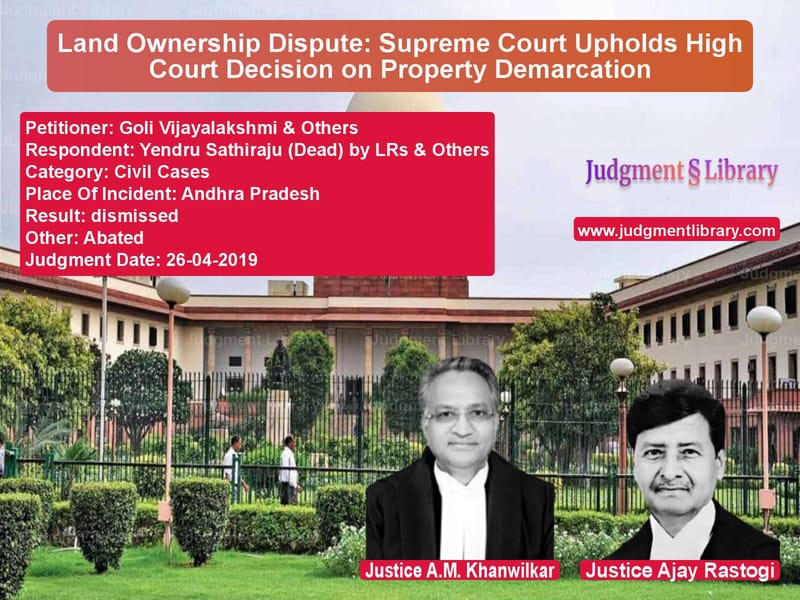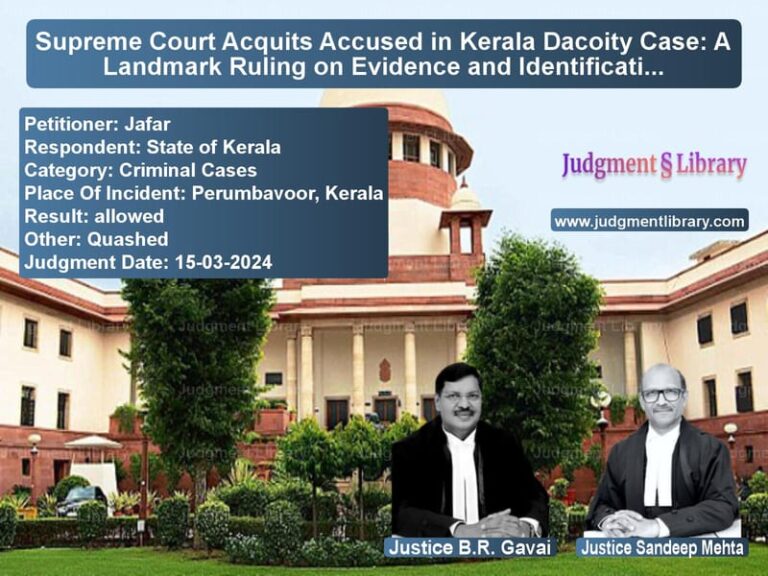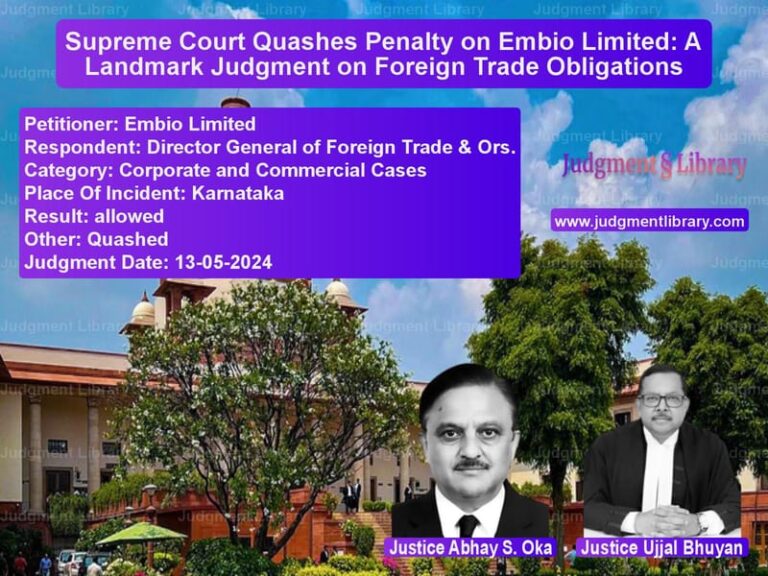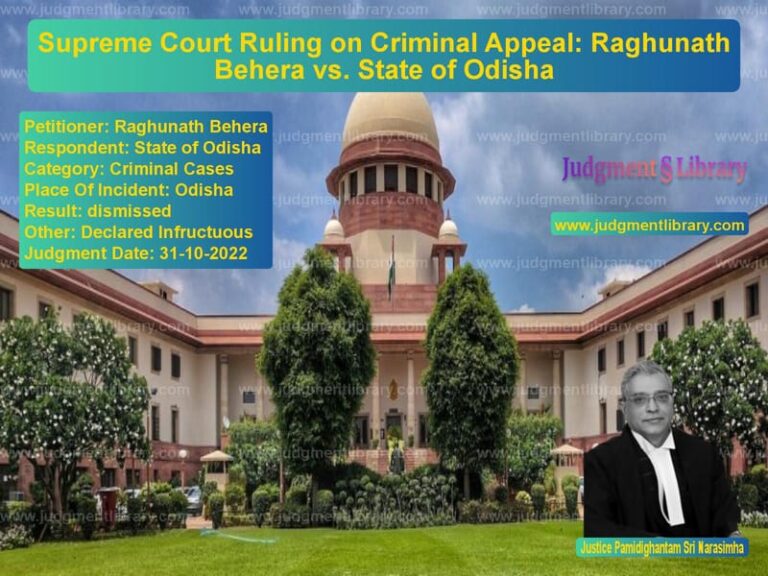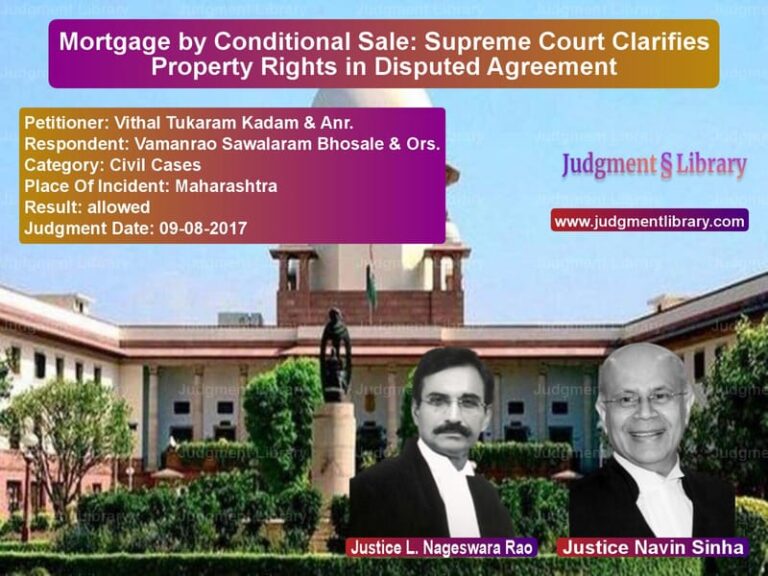Land Ownership Dispute: Supreme Court Upholds High Court Decision on Property Demarcation
The Supreme Court of India has dismissed the appeals filed by the appellants, Goli Vijayalakshmi and others, against the respondents, Yendru Sathiraju (now deceased) and others, affirming the High Court’s decision on the property ownership dispute. The case revolved around claims over suit schedule ‘A’, ‘B’, and ‘C’ properties and whether the appellants had a valid right over them.
Background of the Case
The dispute originated when Yendru Sathiraju filed a suit (O.S. No. 175 of 1987) before the trial court seeking a declaration of absolute ownership over the suit schedule ‘A’, ‘B’, and ‘C’ properties and for recovery of possession from the defendants/appellants. The plaintiff claimed that the properties belonged to his family and were wrongfully occupied by the defendants.
The trial court, after evaluating the evidence, partially decreed the suit, declaring the plaintiff’s title over suit schedule ‘A’ and ‘B’ properties while rejecting the claim over schedule ‘C’ property. The decree directed the defendants to vacate ‘A’ and ‘B’ properties.
The defendants/appellants challenged the trial court’s decision before the High Court in Appeal No. 1146 of 1996. The High Court dismissed the appeal and upheld the trial court’s judgment on November 22, 2005. Aggrieved, the appellants moved the Supreme Court.
Key Issues Before the Supreme Court
- Whether the High Court correctly upheld the trial court’s decision granting title to the plaintiff over suit schedule ‘A’ and ‘B’ properties.
- Whether the suit had abated due to the failure to bring the legal representatives of the deceased appellant (defendant No. 2) on record.
- Whether the decree passed by the lower courts led to contradictory and unenforceable judgments.
Arguments Before the Supreme Court
Appellants’ Contentions:
- The appellants contended that they derived title to the disputed properties through inheritance and that the trial court erred in declaring the plaintiff as the rightful owner.
- They argued that there was an internal division of the suit properties among the defendants, which was not considered by the lower courts.
- The appellants challenged the validity of the trial court’s decree, claiming that it was unenforceable due to the lack of proper demarcation of the properties.
- They asserted that the suit should not abate merely due to the non-substitution of a deceased party’s legal heirs.
Respondents’ Counterarguments:
- The respondents argued that the appellants had no independent or valid title over the suit properties.
- They emphasized that the appellants failed to bring the legal representatives of deceased defendant No. 2 on record, which led to the suit abating against him.
- The respondents contended that allowing the remaining appellants to continue the suit would result in conflicting judgments, as one defendant’s suit stood decreed while the appeal continued for the others.
- They relied on Supreme Court precedents to argue that if a decree against one party becomes final due to abatement, the appeal by the remaining parties would also abate to avoid contradictory rulings.
Supreme Court’s Observations
The Supreme Court upheld the High Court’s decision and dismissed the appeals, stating:
- “The judgment and decree passed by the trial court has become final concerning appellant No. 2 (defendant No. 2) upon abatement of the appeal against him.”
- “If this Court permits the remaining appellants to continue the appeal and they succeed, it would result in contradictory decrees. The suit has already been decreed against one defendant, while it would stand dismissed for others, making enforcement impossible.”
- “Since the suit schedule properties constitute a single unit that has not been demarcated, enforcing the decree against one party while dismissing it for others would be legally untenable.”
- “Once the appeal has abated against one appellant, the decree cannot be indirectly reopened for others by relying on provisions of Order 41 Rule 4 and 33 CPC.”
The Court cited its previous judgments, including State of Punjab v. Nathu Ram (1962) and Sardar Amarjit Singh Kalra v. Pramod Gupta (2003), which held that when a decree against one defendant becomes final due to abatement, the appeal by the remaining defendants also abates to prevent contradictory rulings.
Final Judgment
The Supreme Court dismissed the appeals, stating:
“We find substance in the preliminary objection raised by the respondents, and both the appeals stand abated and accordingly dismissed.”
Conclusion
This judgment reinforces the legal principle that suits involving joint and indivisible properties must be adjudicated without creating contradictory decrees. The ruling clarifies that failure to substitute legal representatives in an abated suit can result in the entire case being dismissed, ensuring consistency in judicial decisions. The decision upholds the integrity of trial and appellate court judgments and serves as a precedent in property disputes involving multiple claimants.
Petitioner Name: Goli Vijayalakshmi & Others.Respondent Name: Yendru Sathiraju (Dead) by LRs & Others.Judgment By: Justice A.M. Khanwilkar, Justice Ajay Rastogi.Place Of Incident: Andhra Pradesh.Judgment Date: 26-04-2019.
Don’t miss out on the full details! Download the complete judgment in PDF format below and gain valuable insights instantly!
Download Judgment: Goli Vijayalakshmi & vs Yendru Sathiraju (De Supreme Court of India Judgment Dated 26-04-2019.pdf
Direct Downlaod Judgment: Direct downlaod this Judgment
See all petitions in Property Disputes
See all petitions in Succession and Wills
See all petitions in Landlord-Tenant Disputes
See all petitions in Judgment by A M Khanwilkar
See all petitions in Judgment by Ajay Rastogi
See all petitions in dismissed
See all petitions in Abated
See all petitions in supreme court of India judgments April 2019
See all petitions in 2019 judgments
See all posts in Civil Cases Category
See all allowed petitions in Civil Cases Category
See all Dismissed petitions in Civil Cases Category
See all partially allowed petitions in Civil Cases Category

